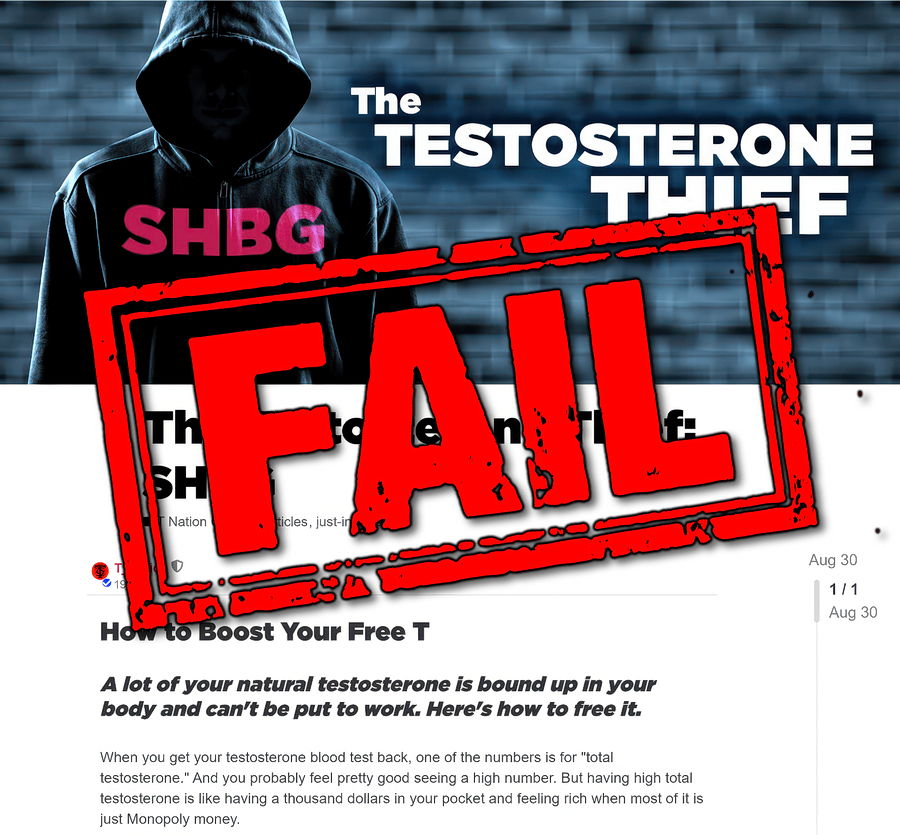Today we return to T-Nation and their latest article covering SHBG and its relationship with total testosterone and the very important “free testosterone.” As they are a supplement company pretending to be a ”hardcore” fitness and bodybuilding magazine, we can expect a lot of bullshit as they try to protect their bro-science lifestyle and sell totally worthless and very toxic supplements that I wouldn’t even touch if they paid me handsomely for trying them.
So, let’s see what they have to say on the subject of testosterone and SHBG.
“Total testosterone levels have almost no value. What matters is “free” and “bioavailable” testosterone. Those things are determined by how much testosterone is bound up by SHBG (sex hormone binding globulin) and serum albumin. These proteins roam around your circulatory system, kidnapping lone testosterone molecules and chemically restraining them.”
That is not how it works. SHBG are carrier proteins that transport sex hormones to different areas of the body, thus playing an essential role in hormone distribution and regulation. SHBG binds to sex hormones (especially testosterone) in the bloodstream, making them biologically inactive until they are released from the bound state, depending on the needs of the body. And by doing this, SHBG limits the diffusion of androgens into target tissues, according to the free hormone hypothesis, thereby protecting against androgen excess and related physiological consequences.



In essence, in a healthy individual, the testosterone bound to SHBG and the amount of free testosterone is perfectly regulated by the body and its needs. It does not “roam around” your circulatory system “kidnapping” testosterone.
And just like SHBG, serum albumin is also a carrier protein, specifically for steroid-like hormones (cortisol, thyroxine,) for long-chain fatty acids, and some other exogenous compounds. It’s the most abundant circulating plasma protein, constituting about half of the total protein content (3.4 to 5.4 g/dL) of plasma. It helps in regulating fluid distribution and blood volume, contributing significantly to plasma calcium levels. And it can also be an indicator of liver function.
“Of the two, SHBG is much more problematic: it holds your testosterone hostage. You could have high total testosterone because of your genetics, supplements, or because you’re getting replacement therapy. However, you might still be experiencing low testosterone symptoms because of SHBG.”
No, you silly twats. There’s no hostage situation here. SHBG only does what it is supposed to do, and if you’re healthy, it should never pose such a problem as in lowering free testosterone to such low levels that you do not function optimally. That would only happen in a damaged body, a body that has been mistreated by a bad diet and high toxic exposure.
I bet that my smart readers have already figured that part out, and I will explain all this in a bit. But first, let’s humor the clueless writers at T-Nation.
How Much T Does SHBG Bind Up?
“When you’re a kid, levels of SHBG are low, but when you hit puberty, they decrease further so there’s plenty of free testosterone available to grow your muscles and manly parts. These levels stay pretty much the same – at least they’re supposed to – until old age when SHBG levels increase and tie up even more of the aging body’s rapidly depleting testosterone levels.
But even young men in their prime have a lot of testosterone tied up and not available. SHBG typically binds up anywhere from 40 to 70% of a young man’s testosterone, but you could have higher-than-normal amounts of SHBG.”
When you’re a kid and become a teenager, you usually have not accumulated that much damage to your body yet, so it should function as it is supposed to do. At least, that was the case in the past, when I grew up in the 70’s and 80’s, and in the generations before me. Nowadays we see a lot of male teenagers that are either skinny-fat or obese with female features due to lack of testosterone (both total and free T.)
And again, age has very little to do with it. That’s correlational assumptions. While we do experience wear and tear as we grow older, and hormones tend to decrease a little bit during the lifespan of an animal, humans are still constructed to live for at least 120- to 150-years old if following our natural human species-specific diet. So by simple logic, it is not normal to see a huge decline (as to sub-functional levels) in total testosterone or free testosterone at only one forth or half-way through your life, as in your late 30’s or even 70’s.
Again, many of you have figured this out by now, that it all comes down to your diet and toxic exposure, as in the accumulated damage done to your body, as in tissues and organs. And if you understand the mechanics of SHBG, therein lies your answer.
“That means that while you might have a total testosterone blood level of 1000 ng/dl, your free testosterone might be a measly 15 ng/dl, which most doctors still consider to be in the normal range. However, a level that low puts men at a high risk of every age-related disease and makes it hard to put on muscle. Even sexual energy is sapped.”
1000 to 1200 ng/dl is elite level, or what you might shoot for with testosterone replacement therapy to feel your absolute best — as in administering 200 to 240 mg of testosterone cypionate a week, spread out to every other day to avoid fluctuations.
So, yes, if your body is overproducing SHBG due to damage, following a retarded diet and being exposed to a toxic environment, you might end up with very low levels of free testosterone despite having a buckload of it.
“However, men should try to maintain levels anywhere from a minimum of 20 ng/dl up to around 30, regardless of age. Part of the way we can do that is to lower SHBG.”
Looking at some older available data from healthy young athletes, especially within track and field and strength sports (aka., “power athletes”,) the average for males was around 40 ng/dL. And the median level among men with “normal testosterone levels,” was about 6.3 ng/dL of free testosterone.
So, sure, 20 to 40 ng/dL would be pretty ideal.
“You might have to increase test levels (naturally or through replacement therapy) to overwhelm your supply of SHBG. Or work to keep SHBG levels on the low side of normal physiological levels: between 10 and 57 nanomoles of SHBG per liter of blood.”
If your total testosterone is below 400 ng/dL you should focus on getting that up by proper nutrition, sleep, and some exercise, or in the worst case, by hormone replacement therapy. Ideally, you should be above 600 ng/dL and closer to 1000 ng/dL to feel and perform your best, and with free testosterone above 20 ng/dL.
Are My SHBG Levels Too High?
“The symptoms of overly high SHBG are almost the same as the symptoms of low testosterone:
- Lack of energy
- Depression
- General lack of joy
- Low or reduced sex drive
- Small testicles
- Inability to put on muscle or lose fat
- Sperm with no mojo
- Male breasts
- Lack of body hair”
Luckily for me, at 50-years old, that bullet list is the complete opposite of the state of my physiology. It should also be mentioned that some of these symptoms can be caused by other factors as well, especially lack of energy, depression, body composition and lack of body hair (from lack of animal fats, as in saturated fats and cholesterol, as well as several essential micronutrients.)
What Causes High SHBG Levels?
“Alcohol: Drinking affects SHBG levels big time. One study proposed that rapid rises in SHBG levels be regarded as a marker for alcoholism.”
That’s kind of a no-brainer as the liver takes damage, and we’ll get to that later. No sane person who actually cares about their health and wellbeing should ever touch alcohol, but I digress.
“Exercise: Weight training increases SHBG, but only temporarily. Training a lot without proper rest or nutrition (overtraining), though, causes a perpetual and detrimental rise in the binding protein.”
High-intensity exercise, such as resistance training, increases testosterone levels for about two hours post-exercise, and if total testosterone goes up, so does SHBG to mitigate the hormonal load. Again, SHBG protects against androgen excess. So, this increase in SHBG is irrelevant as both total testosterone, free testosterone, and bound testosterone goes up.
“Other Hormonal Imbalances: High thyroid and high estrogen can cause high SHBG levels, as can low growth hormone levels.”
All these hormonal imbalances are the result of a bad diet and high toxic load. And that does not mean that high estrogen necessarily increases SHBG, it simply means that the terrain you have caused in your body by your lifestyle and bad diet causes damage and an increase of both estrogen and SHBG. And again, the diet is key here, and we’ll get to that.
“Advancing Age: The older you get, the more SHBG you have to contend with.”
This should not be a real problem until you’re 105-years old or so. It’s the accumulated damage from your lifestyle, as in your diet and toxic exposure that is the real culprit.
“Other Factors: Smoking, stress, malnutrition, and excess fructose intake.”
Yes, all of these, and it’s funny that you mention fructose when in reality the largest reason for increased SHBG is from repeatedly elevated levels of blood glucose. Still, you fail to mention carbohydrates and only mentioned fructose.
The Real Reason of High SHBG Levels
Within physiology and biology, it’s been clearly established that chronically high blood glucose levels can lead to an increase in SHBG — and there are several reasons for this, ranging from damage-induced overproduction and to simply help with glucose metabolism.
As you should know, every time you consume carbohydrates, you upset our homeostasis by providing glucose from an exogenous source, overriding our natural glucose-manufacturing pathway of gluconeogenesis. Our bodies are designed to run on fatty acids and to only provide the exact amount of glucose we need at any point in time, and this is why blood glucose is tightly controlled, because glucose is extremely toxic to blood vessels, nerves, soft tissues and organs. So, every time blood glucose is elevated above its normal range, as in when consuming carbohydrates, damage is done to these tissues, and that damage accumulates. As years go by, many cells has been severely damaged and begin to limit their uptake of glucose as a protective mechanism and that is what they call “insulin resistance,” and this is when blood glucose levels can be described as chronically high, and this is when a lot of stuff begins to go really wrong in our bodies, including SHBG.
And considering the enormous consumption of carbohydrates among a lot of people, we see all these “modern diseases” from a bad high-carbohydrate diet manifesting at a younger age, even in teens and children. So, it’s not surprising that a lot of young men experience both low testosterone levels and higher levels of SHBG than normal.
First, let’s look at the liver. Liver damage and dysfunction can lead to the liver overproducing SHBG, and this has been observed in livers damaged by prolonged exposure of high blood glucose.


Next we have the thyroid who regulate the synthesis and clearance of SHBG. So, what can really mess up the thyroid? Oh yes, you guessed it! Chronically elevated levels of blood glucose from consuming carbohydrates!
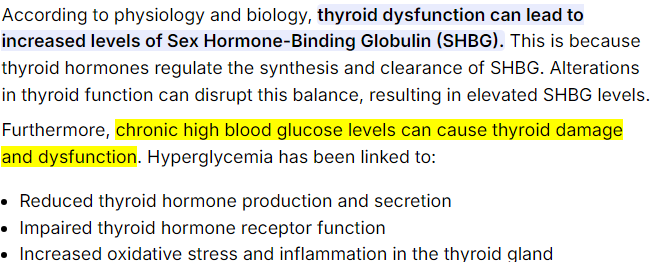


Do you see a common thread yet? Yes, elevated blood glucose is bad, mkay? Carbohydrates are not for human consumption, mkay?
And here’s the kicker, as I hinted about earlier. While SHBG is mainly known as a carrier of sex hormones, it can also interact with glucose metabolism pathways, working in symbiosis with insulin to increase the cell’s storage capacity of glucose as glycogen. Thus aiding in lowering the damage from elevated levels of blood glucose. So, if your cells are beginning to resist glucose, SHBG levels will increase every single time you consume carbohydrates as a desperate measure to help clear out that toxic glucose.

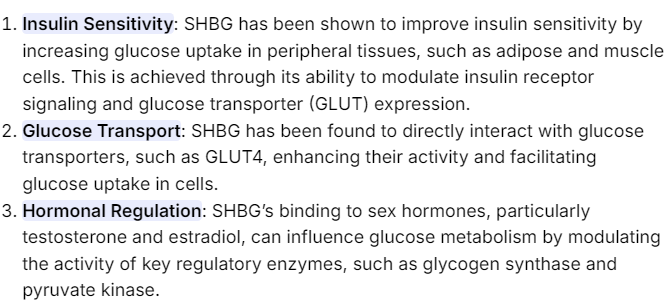
Funny that T-Nation did not even mention this. Only fructose, which in itself is very toxic to the liver, but they did not even elaborate on that particular fact either.
What Can I Do to Lower SHBG Levels?
“Plenty of things will reduce levels of SHBG. You could, for instance, just have a high-carb meal. Insulin blocks SHBG.”
I’m frikkin’ speechless. Yeah, go right ahead and consume more of what caused all that damage and your problems in the first place. You retarded morons!
Insulin does not block SHBG, they work together to reduce the damage from elevated blood glucose. And that also means that consuming that “high-carb” meal increases the levels of SHBG. Some of it is only temporarily redirected to glucose metabolism. But once blood glucose levels are back to normal, chances are that you are left with even more SHBG floating around than before the meal. That’s a double fuck-up.
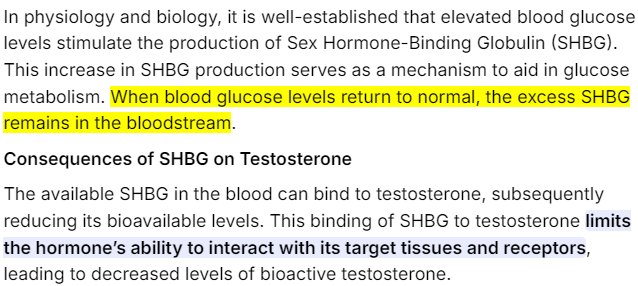
“Following a high-protein diet is a big first step. Also, make sure you’re doing all the things you’re supposed to do to build a healthy body in general, like getting enough sleep, eating the right foods, and not getting so stressed out.”
After this, the T-Nation crew goes into useless supplements. Still, fixing any hormonal issues is very easy, although it can be a lengthy process depending on the damage you have accumulated throughout the years.
It is obvious that you should eliminate all carbohydrates from your diet, that is a no-brainer. Also, you need to minimize all toxic foods, and that is simply anything that is plant-based and/or processed.
You should be following a “diet” that is appropriate for your species, as in an animal-based preferable carnivorous diet — a diet that is high in animal fats and moderate in protein. I’ve covered this hundreds of times with indisputable evidence.

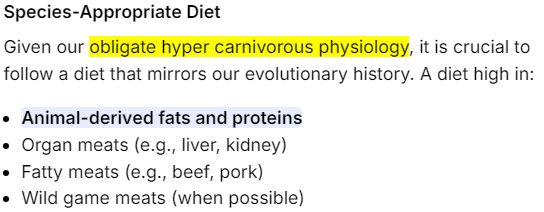
Following a “ketogenic” style of eating and running on our natural fat metabolism will also restore the functionality of gluconeogenesis — as in our ability to manufacture our own precise amounts of glucose as needed. And guess what, SHBG is also involved in gluconeogenesis, which means that a lot of it will be used to regulate this natural process, as your physiology was meant to function. That will also mean more free testosterone.

While I have a lot more to say about SHBG and testosterone, I only have about 60 to 90 minutes to think up and write my articles, and another 45 to 60 minutes to fix images, to edit and publish the article, so I have to cut it short here.
If you need help with your hormones, regaining your health, and/or transitioning from your current way of eating to our natural species-appropriate, species-specific way of eating, I’m available for both coaching and consultation.
And if you found the article and my insights helpful and enjoy my free information, please consider donating to help pay the webhosting bills and keep the site running. And if you’re interested in discussing and sharing information with likeminded people, consider joining our uncensored community at Ungovernable.se. Thank you!


